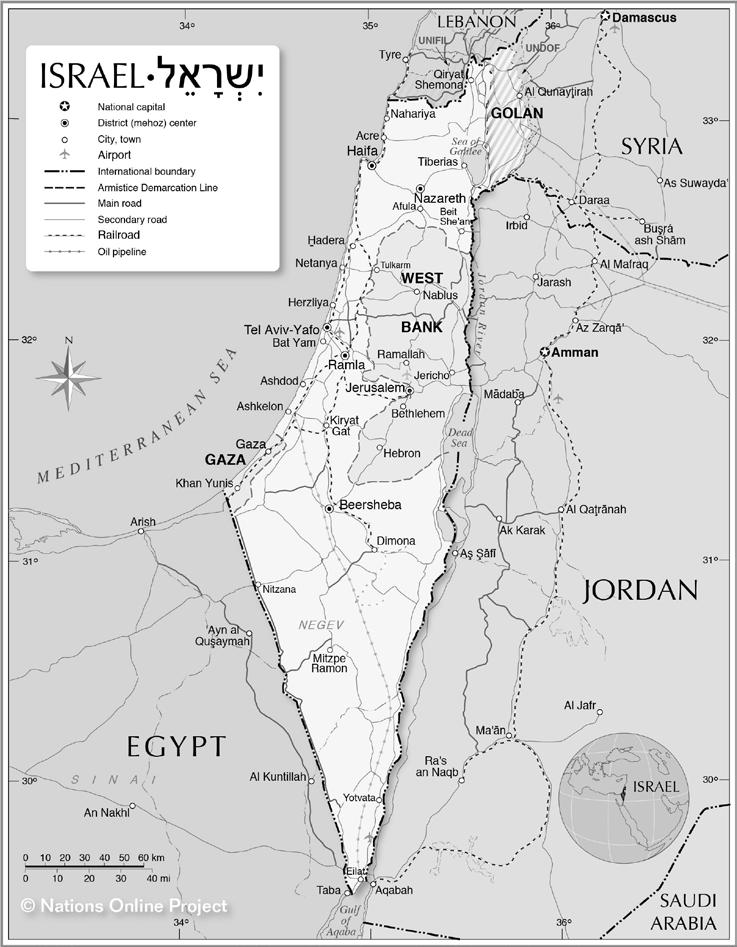
4 minute read
Living in Israel
Living in Israel (where sometimes plans and reality converge, but sometimes not) By Miriam Feigelman
Despite being greeted by a bevy of girls singing and dancing to welcome our arrival on a Nefesh B’Nefesh flight, making Aliyah has been a humbling experience. In a good way. We have learned to live life day by day by day. Outside of Israel we conceptually understood we were not in charge. But given that there was an apparent cause and effect between our plans and the expected outcome, we were hard pressed to realize how little control we actually had.
Advertisement
We have learned not to take anything for granted. Here, we make plans and then, whatever actually happens, happens. Sometimes plans and reality converge, but often not. The repairman actually shows up within the expected timeframe? A gift! The correct appliance is actually delivered? A special surprise! Mussar lessons abound in the most unexpected places: • Girls in mini-skirts and low cut blouses kissing the mezuza as they walk into a public building • Cab drivers giving us hearty welcomes and brachot for an easy yishuv; not complaining when we’re short a shekel or two, telling us it’s OK (we ran out of change) • Repairmen with uncovered heads lauding our decision to make Aliyah and emphasizing how we should thank G-d we are able to live here • At a restaurant, a loud and hearty Amen coming from men, gold chains dangling around their necks, who look like they belong in the mafia • The waitress in skinny pants concerned that we are mixing fish and dairy (a Sefardi custom, not ours) • The bareheaded waiter telling a friend who is obviously wearing a wig that she shouldn’t be having coffee at his café since it is open on Shabbat • The Egged bus driver, who, after the bus breaks down TWICE on our way to Jerusalem, says, “It’s all in Hashem’s hands, not to worry. Let’s get out and daven maariv while we’re waiting.” And the bus proceeds to empty of all the men. We have undergone a cleansing process for the ego, tossed about like the laundry in our front loaders, to ensure that it is crystal clear just WHO is in charge. Certainly not us.
I find myself too easily intimidated by some cab drivers and delivery men who overcharge; do they see an American and think “Now is my big opportunity”? Part of me views this as my contribution to the Israeli economy.
A strange highlight in this saga is my very humbling encounter with Varda, the Russian Israeli ozeret. She is somewhat of a cross between a Soviet colonel ferociously attacking any smidgen of dirt (dislodging shower
doors off their tracks in the process) and a trapeze artist, with her lithe figure ably clambering up to the highest shelves, sans ladder. She comes loaded with a backpack full of products and proceeds to tell me this is what she needs to use, and it will be 535 shekel please. She gives me a lecture on the need to keep windows and cabinet doors open to avoid mold and mildew buildup. She even aggressively attacks a stain on the beautiful forest green black-veined marble kitchen counters with toilet cleaner. The result is a large patch of white disfiguring the stone. [But Divine intervention intercedes here with a strange thought: what if I treat the area with warm olive oil, it works for hair, doesn’t it? For two days and nights the stone soaks up olive oil, covered with paper towels and plastic, then voilà the deep green black-veined marble returns! But I digress.]
She also lets me know she normally charges 100 shekel an hour but is giving me the bargain rate of 350 for 4 hours. Not to worry; that relationship was short-lived. On the other hand, experiences that evoke feelings of exhilaration, exuberance, and a deep sense of contentment. They provide a wonderful counterbalance:
Walking home in Netanya at sunset with stunning pinks and orange stretching across the horizon over the sea as the waves rhythmically crash on the shore.
Strolling on the lovely tayelet and finding the shop of the artist Abecassis. Working at his table, he is surrounded by large paintings filled with blazing colors and small figures floating Chagall-like around the canvas. The door is open and he takes the time to graciously serve me. I walk out with a beautifully illustrated, illuminated SeferTehillim. All totally unplanned. EVERYONE, no matter what affiliation or degree of observance, wishing each other Shabbat Shalom. And I learned my favorite expression from a Moroccan cab driver. כל דעביד רחמנא לטב עביד All that Hashem does is for the good. The Egged bus driver, who, after the bus breaks down TWICE on our way to Jerusalem, says, “It’s all in Hashem’s hands, not to worry. Let’s get out and daven maariv while we’re waiting.” And the bus proceeds to empty of all the men.









